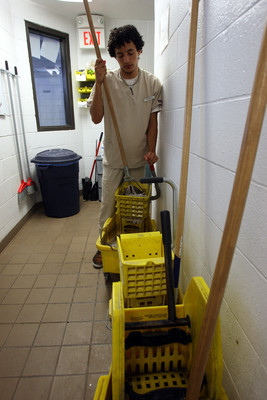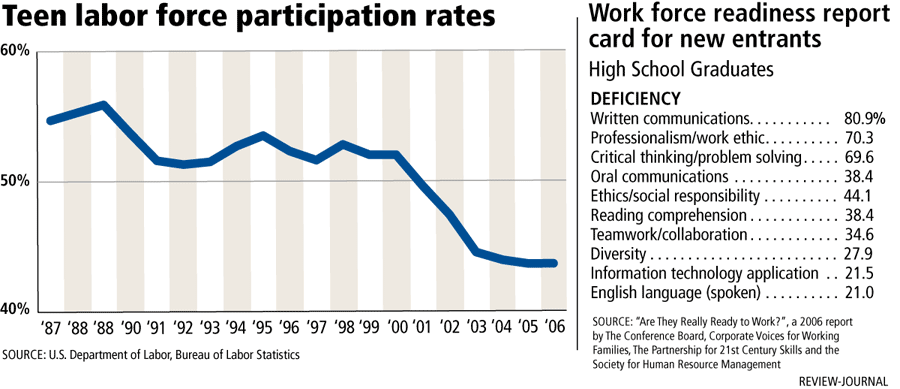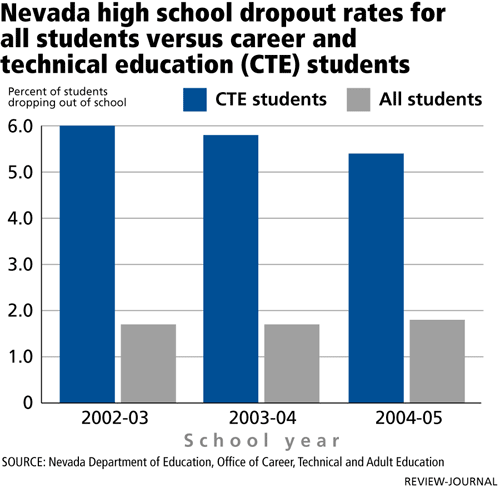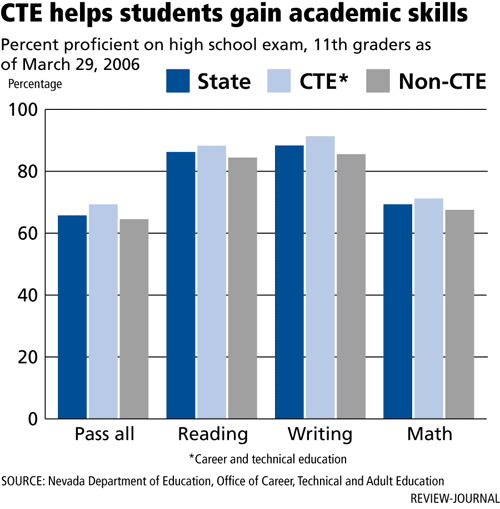A Break in the Routine
Kylie Sandberg spent many an idyllic day last summer -- sleeping in until 10 a.m., heading off to the gym, hanging with friends.
Her friend, Tina Taylor, followed a similar but more disciplined routine, lacing up early in the morning to run with her Centennial High School cross-country teammates.
Both 16-year-olds wound up taking the summer off. They applied for jobs, they say, but employers never called them.
Getting a paying gig next summer is a must, though. Parental pressure is mounting.
"My mom keeps telling me to get a job because she is tired of giving me money," says Sandberg, a junior at Canyon Springs High School.
Summer used to signal a rite of passage to adulthood: snagging that first job. But the declining presence of youths in the work force throughout the year, whether it's behind the counter of a fast-food restaurant or in a lifeguard chair at community pools, is resonating nationwide.
Sandberg and Taylor are among the growing legion of 16- to 19-year-olds who, for a variety of reasons, are absent from the labor market.
The U.S. Bureau of Labor Statistics said participation rates, the proportion of people working or actively seeking work, are typically highest for teens in July. That month has seen substantial declines since 2000, dropping to 41.2 percent this year.
It's not just a summer phenomenon. The annual average percentage of teenagers in the work force has stayed below 50 percent since 2001.
"If adult employment fell by the same rate teen employment has in the last 10 years, that would be the greatest loss in American history since the Depression," says Andrew Sum, director of the Center for Labor Market Studies at Boston's Northeastern University, in an online business journal report published earlier this year by the Wharton School of the University of Pennsylvania.
The trend troubles some labor experts. Getting a late start developing work habits and skills essential for holding a job bodes ill for American society, they say, because it will exacerbate the shortage of qualified workers as baby boomers start retiring.
Employers already take a dim view of newcomers to the labor market.
"The future U.S. work force is here -- and it is woefully ill-prepared for the demands of today's (and tomorrow's) workplace," concludes a comprehensive report released last fall, titled "Are They Really Ready to Work?"
The report, conducted by four major groups, was based on a survey of 431 companies that collectively employ more than 2 million Americans.
Not surprising, high school graduates fared far worse than college graduates in skills assessed for the entry-level jobs they typically fill.
A majority of employers deemed high school graduates deficient not only in basics such as written English and math, but also in the applied skills of critical thinking, problem solving, professionalism and work ethic.
They were ranked adequate in a few areas, but excellent in none.
The report poses the question: How can the United States compete in a global economy if its emerging work force consists of high school graduates who are inadequate and college graduates who are more adequate than excellent?
Furthermore, whose job is it to prepare them?
Nearly 76 percent of employers named schools, from kindergarten through 12th grade, among their top three choices. Fewer placed the burden on four-year and two-year colleges.
Almost half said the responsibility falls to the new workers themselves.
Nineteen percent said it is up to employers. More than 11 percent pointed to the business community at large.
Interestingly, "parents" was not listed as a choice. But many employers commented that instilling the value of education, work and career is in a parent's job description.
NO SUBSTITUTE FOR EXPERIENCE
The Catch-22 teenagers often face is that they can't get a job without experience, but they can't get experience without a job.
Nowadays, many youths say they can't find work; critics maintain they're simply not looking hard enough.
But demographic forces are working against teens, who find seasoned competition from immigrants and workers 55 and older.
Some teens are opting out of the labor market. They choose instead to volunteer or attend school year-round.
All of this contributes to a falling rate of teen participation in the work force, and it's only growing more pronounced. The ratio has trended downward since the late 1970s, with the decline accelerating since 2000.
In 1948, when the federal government began tracking the youth labor market, 53 percent of teenagers worked or sought work. In 2006, the figure was 43.7 percent.
Recent statistics for Nevada, which contribute to the nation's rates, were based on a sampling of about 850 households, too small to be considered statistically significant.
Jeff Waddoups, associate economics professor at the University of Nevada, Las Vegas, says the trend is understandable, given that the wages teens usually earn in low-skill jobs haven't kept pace with inflation for years.
In April, the Economic Policy Institute reported that the cost of living had risen 26 percent since September 1997, while the minimum wage had fallen in real value to its lowest level since 1955.
Investing in education is a better long-term choice, Waddoups adds, because it can increase teens' earning power down the road.
"They have other options, so what employers interpret as teens not having a work ethic is just people responding to economic incentives," he says.
Besides, Waddoups is not so sure the kinds of jobs teenagers usually take, such as flipping hamburgers or bagging groceries, provide them with invaluable experience.
"I actually think it's not a bad trend, as long as they are doing something useful to prepare themselves ... as opposed to spending all their time on MySpace."
Labor statistics show that on school days, employed high schoolers spend an average of 42 fewer minutes on educational activities and sleep 36 fewer minutes than their nonworking peers.
Conventional wisdom says financial necessity helps determine which teens pursue jobs and how doggedly. Yet an April report by the Center for Labor Market Studies shows that teens whose families earn from $75,000 to $100,000 a year are more likely to work than those earning less than $20,000 a year.
Meanwhile, delaying entry into the work force doesn't shorten the learning curve.
One employer cited in the report "Are They Really Ready to Work?" groused about "horrendous turnover rates" among high school graduates, noting their failure to show up for work and tendency to have what sounds like an overdeveloped sense of entitlement.
"Kids want to get that top job right away, the nice air-conditioned office with a computer -- never mind that the way managers achieved those jobs was by starting at the bottom and working their way up."
One human resources director was appalled that young potential hires show up in cut-off jeans:
"They have no understanding of how to act in an interview, no presentation skills, and a total lack of understanding of the impression they're making on the employer. Instead, the attitude is 'Hey, take me for what I am. I am an individual,' and that's what matters most."
ARE EMPLOYERS MISSING A BET?
Some local employers give teen workers more positive reviews.
Suzanne Infurno, manager of Smith's at The Hualapai Commons Shopping Mall in Summerlin, says the grocery store chain specifically targets teen workers, who must be at least 16.
"I found that they are very dependable and have such great energy," Infurno says.
Their shortcomings are infrequent and minor, she says, such as forgetting to tuck in their shirts or when they are supposed to work. When they call in sick, they usually have arranged for someone to cover their shift.
Clark County Parks & Recreation depends heavily on teen hires for its summer recreation program. The department typically hires up to 250 seasonal staff workers, most of whom are high school or college age.
It found a way around its declining labor pool by slightly raising wages and lowering the working age to 151/2.
Jessica Ralles, who heads the county's summer aquatics program, chalks up the pinch to competition from casino-hotel pools: "It's definitely been a struggle the last two years."
Although most of these seasonal employees are high achievers, she says, some take their jobs less seriously. They show up late or gab with friends in staff areas where they are not allowed.
"Basically, they don't work for us for very long," Ralles says. "A few every summer have to be fired."
Her pet peeve? When teens have their parents call in sick for them or have their parents ask work-related questions.
"A lot of the time you have to coach your staff to be self-sufficient," Ralles says.
Some teens told the Review-Journal that a lot of the negative rap against teens is undeserved.
"I think that kids today are more prepared than kids back then, like in the '70s, I guess," says high school junior Sandberg. "They might say that we are not, but I think we are. We are smarter than they think."
Many nonworking teens say they grasp that paychecks represent hours worked, not just showing up at the job. And they don't view parents as virtual ATM machines; after all, the money they receive is usually tied, if indirectly, to chores performed.
But they also want stimulating and meaningful careers, not just jobs.
"I want to work somewhere where I can have fun," says Taylor, who thinks she didn't get a job last summer because she hadn't yet turned 16.
The antithesis of a slacker teen is Travis Brewer, a 17-year-old senior at Las Vegas Academy who works weekends during the school year at Craig Road Animal Hospital. He worked there full-time during the summer and also does volunteer work for charities.
"With my parents, school comes first," he says. "We tried it another way, working four nights a week during school, and it didn't work."
Brewer said he worked last year to help his family with financial struggles. He also is saving for college.
Many of his friends who took summer jobs later quit because they wanted to enjoy their time off school, he said.
"The ones who really want a job, they can get a job," he says. "The ones who don't, they are expecting, without any experience, better jobs."
Some refuse to work in janitorial positions or food preparation.
"They want something more dignified. They figure it would be below them," Brewer says.
"It's a status thing."
COLLEGE FOR EVERYONE?
Parents and society at large reinforce the notion that a college degree is the best ticket to a successful career.
Indeed, the work readiness assessment report predicted that from 2000 to 2015, about 85 percent of newly created U.S. jobs will require education beyond high school.
But that doesn't necessarily mean four years of college.
Not everyone is college material, says Jamie Ditto, dean of students at Bonanza High School.
"I think that students, as they get further into the high school years, they realize that maybe they are not as high-achieving as some of their peers and feel that pressure."
Those who think they can't be successful without a four-year degree might be inclined to drop out, she says.
There are alternatives.
"There is a tremendous amount of trade employment -- mechanics and technicians and electricians and plumbers -- all of those jobs that don't require a four-year college degree," Ditto says.
The same goes for broad professional fields, such as health care and education. Not every worker in those industries is a doctor, nurse or teacher, she says.
While some labor experts say vocational schools have fallen out of fashion, Nevada educators disagree.
A nationwide resurgence in career and technical education, or CTE -- formerly called vocational school -- is under way, particularly in Nevada.
In the 2005-2006 school year, 51 percent of high schoolers statewide were enrolled in these courses. Compared to other students, they had lower dropout rates and higher proficiency scores on high school exams.
In Clark County alone, more than 250 courses are offered at high schools, starting as early as the ninth grade. The county also has three specialized CTE schools, not counting the Northwest Career and Technical Academy, which opened last month. Four more such schools are coming on line by the 2009-2010 school year.
A lottery system is used for the most popular programs, such as those for medical assistants.
Unlike the vocational wood-shop classes of yore, many CTE classes call for sophisticated understanding of math and science.
"In the automotive industry, everything is so computerized, so kids are learning at a much higher level of rigor," says Kathleen Frosini, the school district's CTE director.
"They find something they can be passionate about, and they see a relationship between what they are asked to learn in their math and science classes. They are asked to use their academics and apply that in a technical setting. All of a sudden, it becomes real," she says.
Many of these high-skilled jobs are touted for the high wages they bring.
But the two don't always go hand in hand.
Globalization and outsourcing has changed that, according to "Tough Choices or Tough Times," a report by the National Center on Education and the Economy.
It was once unheard of that highly educated workers in other countries would be willing to work for low wages, the report states. But that is no longer the case: "Today, Indian engineers make $7,500 a year against $45,000 for an American engineer with the same qualifications."
Increasingly, it's getting easier for employers everywhere to get workers who are better skilled and at lower cost than U.S. workers.
Education plays a pivotal role. While the United States had the best-educated work force in the world for most of the 20th century, the report states, that no longer holds true.
The core problem is that the country's education and training systems were built for an earlier era.
"American students and young adults place anywhere from the middle to the bottom of the pack in all three continuing comparative studies of achievement in mathematics, science, and general literacy in the advanced industrial nations."
The report, which calls for an overhaul of the American education system, says the passport to a good job lies in developing abilities in several key areas -- reading, writing, speaking, mathematics, science, literature, history and the arts -- and dealing with ideas and abstractions.
The United States already pays the price of not preparing high schoolers with the basic skills they need to succeed in college or at work. The nation loses more than $3.7 billion a year, including $1.4 billion to provide remedial education to recent high school graduates, according to an August 2006 brief by the Alliance for Excellent Education.
The work readiness report "Are They Really Ready to Work?" states that the business community is already sounding alarms about the need to educate tomorrow's work force.
Foreign languages, more than other basic skills, will become increasingly important over the next five years, it states; so will creativity and innovation.
"We need people who think with the creative side of their brains," says one employer in the study, "people who have played in a band, who have painted, been involved in the community as volunteers ... learning how to kick-start a new idea, or how to get a job done better, less expensively."





















